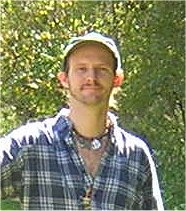I believe that what is above and what is below are one and the same.
I believe that what is within and what is without are one and the same.
I believe that everything, everywhere, is one and the same.
No one great spiritual teacher has a monopoly on spirituality. Only now -- as the world grows smaller and we begin to understand each other a bit better -- do we even begin to see the whole picture with regards to the spirit. And there is so much more yet to discover!
But we do understand enough to know that all the larger things are made up of the smaller things. That the universe is simply made up of many many simple things. And we can know that the universe makes much more sense than it at first appears to.
Everywhere we look -- in chemistry, physics, astronomy, medicine, any of the sciences -- we see the same patterns repeated. The arrangements of atoms and molecules looks no different than the arrangement of stars and galaxies! And so, also, are our bodies arranged.
Some time ago a philosophy called "The Gaia Hypothesis" became popular. In this world-view it was assumed that the earth is a living organism who maintains herself -- that is, that the environment is a living entity with all the repercussions that life entails.
I believe this idea helps to explain the way we find the earth. But I believe it does not go far enough.
I believe the entire universe functions as a life form: the universe is alive! Not in the way we normally conceive life to be. Rather, I believe the universe maintains itself and grows and does the many things which make itself complete.
I look at the universe as the ultimate form of life. And I tend to believe that it is That which we call God. I find that this is perhaps the best explanation to reconcile the various god-interpretations of the many world religions. For there are some who believe that God is one (the universe as a whole), and some who believe God is many (the various parts which make up the universe). There are some who believe God is a formed being (matter/people/the many parts which make up the whole), and some who believe that God is spirit (the unifying force behind creation). There are some who believe that all things have a spiritual nature to them; that is to say, they believe that everything has a spirit associated with it. This is easily explained in that, as we are each a part of the universe, and therefore a part of God, we each contain a tiny piece of that Great Spirit within us.
And here is the great charge: as we each contain a piece of God within us, we should each treat one another with the same respect and love we would have for God -- and for self. We are not the many separate beings we appear to be. In fact, we are both interrelated and interconnected. We must work together in harmony for the body of the universe -- the body of God -- to function well. Therefore, it is important to "do unto others as we would have them do unto us".
And so we discover that we are part and parcel of the Body of God, and so is all else. We live in a sacred place; a holy temple. Everything here is sacred. We simply must look for the Holiness -- for God -- wherever we turn.
God creates, preserves, and destroys: to recycle and create again. The Hindus have long understood this, as their trifold groupings of deities demonstrates. As an example: Brahman creates the universe, while Indra preserves it, and Shiva destroys it. And the universe works in cycles of creation, preservation, and destruction. Brahman opens his eyes and the universe comes into being, and as he closes them it is destroyed. Again, and again, the cycle repeats itself. So we see the cycles in our world. Seasons come and go, to repeat the following year. Lives are lived, and new births for those which will take their places. And also stars are born and destroyed and reborn. It is no wonder the Hindus place such an emphasis on reincarnation. Although, I believe we are not recreated as we are today, I believe that all the makings of our bodies are recycled.
Many times we are fearful of others because they look different, or believe differently, or live differently, or love differently. But we should be more accepting because they are and they do believe, and they do live, and they do love -- as we all do.




